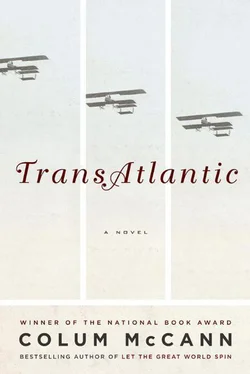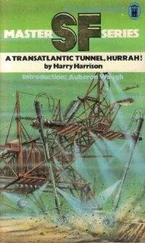He was sure, as the carriage turned the corner by the university, that the boy volleyed out his first name.
HE HEARD IN the newspapers that O’Connell was due to speak to a giant crowd along the Dublin docks. The tribune of the people. Ireland’s truest son. He had spent his life agitating for Catholic emancipation and parliamentary rule, and had written on abolition, too. Brilliant essays, fervent, impassioned. O’Connell had adventured his life for proper freedom, was known for his speeches, his letters, his rule of law.
Douglass canceled a tea in Sandymount to get there on time. He arrived along the teeming docks. He could not believe the size of the crowd: as if the whole sponge of Dublin had been squeezed down into a sink. Such a riot of human cutlery. The police herded the crowds along. He lost Webb and pushed his way through, made his way to the stage as O’Connell emerged. The Great Liberator looked portly, tired, out of sorts: he had apparently been so since his release from jail. Still, a giant roar went up. Men and women of Ireland! The din was extraordinary. O’Connell held a speaking trumpet, and when he spoke into it the words shot up out of him, huge, fearsome, brimming. It astounded Douglass, the logic, the rhetoric, the humor.
O’Connell held the crowd in the well of his outstretched arms. He swayed forth. Slowed down. Pivoted on his heels. Paced the stage. Adjusted his wig. Allowed silences. The speech was relayed by others who stood on tall ladders and passed the word along the dockside.
— Repeal is Erin’s right and God’s decree!
— Withersoever we turn, England has reduced our nation to bondage!
— The employment of force is not our object!
— Associate, agitate, stand by me!
The hats went up in the reeking air. The cheers stepping in rhythm along the crowd. Douglass stood, transfixed.
Afterwards, a huge mob surrounded the Irishman. Douglass forced his way through, excused himself past dozens of pairs of shoulders. O’Connell looked up, knew immediately who he was. They shook hands.
— An honor, said O’Connell.
Douglass was taken aback.
— Mine alone, he said.
O’Connell’s hand was pulled away. There was so much Douglass wanted to speak of: repeal, pacifism, the position of the Irish clergy in America, the philosophy of agitation. He reached forward to grasp the Irishman’s hand again, but there were already too many bodies between them. He felt himself pushed back, jostled. A man shouted in his ear about temperance. Another wanted his signature for a petition. A woman curtsied in front of him: a smell of filth rolled off her. He turned away. His name rang out at all angles. He felt as if he were spinning in eddies. O’Connell was being guided down off the stage.
When Douglass turned again, Webb had his arm, said they had an appointment in Abbey Street.
— Just a moment.
— I’m afraid we must go, Frederick.
— But I must talk with him—
— There’ll be more chances, I assure you.
— But—
Douglass caught eyes with O’Connell. They nodded to each other. He watched the Irishman move away. Slumping within his bright green coat. Wiping his handkerchief on his brow. His wig shifting slightly on his head. A slight sadness there. But to have that command, thought Douglass. That charm. That energy. To be able to possess the stage in such an extraordinary way. To stir justice without violence. The way the words seem to enter the very marrow of the people who still hung around the dockside, bits of refuse floating on the water.
TWO DAYS LATER, in Conciliation Hall, O’Connell brought him on stage and he thrust Douglass’s hand in the air: Here , he said, the black O’Connell! Douglass watched the hats go up into the rafters.
— Irishmen and Irishwomen …
He looked out over the tip heap. All muck and adulation. Thank you, he said, for the honor of allowing me to speak with you. He held out his hands and calmed the crowd and spoke to them of slavery and commerce and hypocrisy and the necessity of abolition.
An energy to him. A fire. He heard the ripple of his words move through the crowd.
— If you cast one glance upon a single man, he said, you shall cast a glance upon all humanity. A wrong done to one man is a wrong done to all. No power can imprison what is good and right. Abolition shall become the natural thought of the world!
He paced the stage. Tightened his jacket. It was a different crowd than any he had seen before. A low rumbling amongst them. He allowed a silence. Then punched up his sentences. Stretched his body towards them. Sought their eyes. Still, he could feel a distance. It troubled him. A bead of moisture lay at the base of his throat.
A shout came up from the rear of the hall. What about England? Would he not denounce England? Wasn’t England the slave master anyway? Was there not wage slavery? Were there not the chains of financial oppression? Was there not an underground railroad that every Irishman would gladly board to get away from the tyranny of England?
A policeman moved into the back of the crowd, the pointed helmet disappearing. The heckler was soon quieted.
Douglass allowed a long silence: I believe in Erin’s cause, he said. A wave of nodding heads crested below him. He had to be judicious, he knew. There were newspaper reporters scribbling down every word. It would lead back to Britain and America. He paused. He lifted his hand. Turned it slightly in the air.
— What is to be thought of a nation boasting of its liberty, he said, yet having its people in shackles? It is etched into the book of fate that freedom shall be universally delivered. The cause of humanity is one the world over.
A relief poured through him when the crowd applauded. O’Connell walked on stage and raised his hand in the air once more. The black O’Connell! he said again. Douglass took a bow and glanced down to see Webb near the front row, chewing the stem of his eyeglasses.
AT DINNER ON Dawson Street he sat alongside the Lord Mayor, but leaned his chair back so he could talk with O’Connell.
Later that evening they strolled together in the garden of the Mansion House, moving solemnly among the pruned winter rosebushes. O’Connell hunched over slightly, with his hands clasped behind his back. He wished, he said, that he could be of more direct help to Douglass and his people. It burdened him terribly to hear that there were many Irishmen among the slave owners in the South. Cowards. Traitors. A discredit to their very heritage. He would not let their shadow fall upon him. They brought a poison with them, a shame on their nation. Their churches should be shunned. They had taken an oath of false supremacy.
He took Douglass by the shoulders. He had killed a man once, O’Connell said. In a duel in Kildare. Over a point of Catholic pride. Shot him in the stomach. Left a widow behind, a child. It haunted him still. He would not kill again, but he would still die for his true belief: a man could only be free if he lived in the cause of liberty.
They talked gravely about the situation in America, about Garrison, Chapman, the presidency of Polk, the prospect of secession.
There was something encyclopedic about O’Connell, yet Douglass could sense in the great man a hidden exhaustion. As if the very questions he carried were too heavy to hold and they had eased their way into his flesh, lodged themselves in his body, bound him down.
He felt O’Connell’s arm upon his and he could hear the labored breathing in the silence between steps. A thin man stalked the far side of the garden, tapping at a timepiece that hung down from his waistcoat.
O’Connell sent the man away, but Douglass thought he recognized, for the first time ever, the small defeat of fame.
Читать дальше












